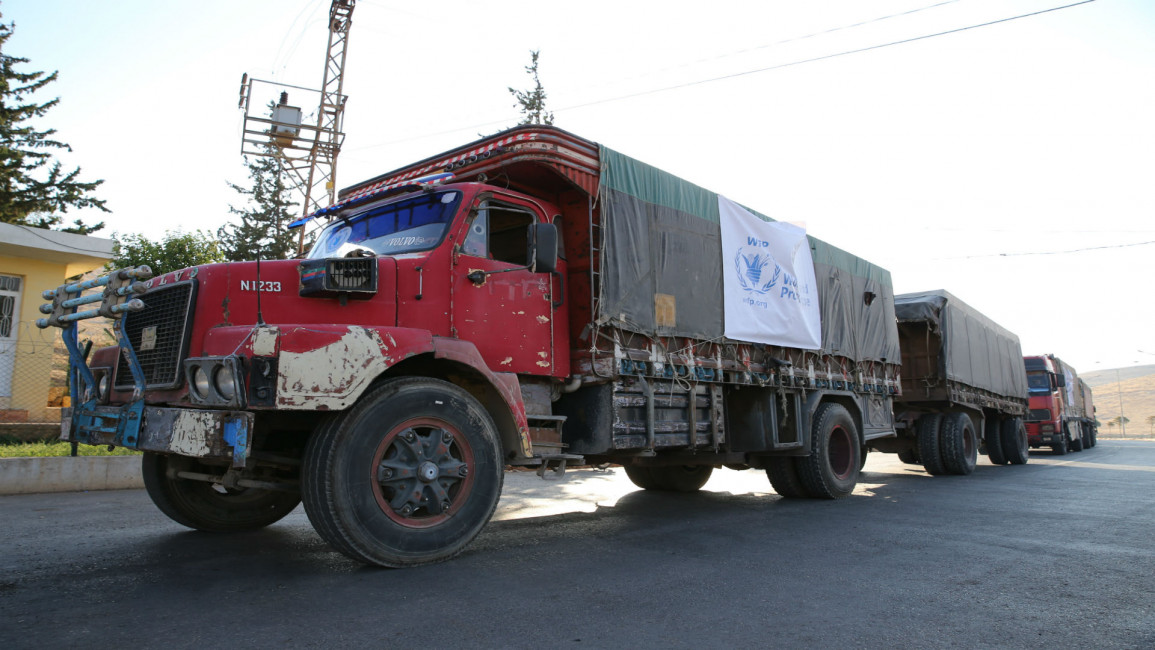Syrian regime 'blocked most aid convoys scheduled for September'
More than 80 percent of the UN’s aid convoys to Syria have been blocked or delayed during one of the bloodiest months of fighting since the civil war began.
The Syrian government agreed to allow the UN and its partners to send 33 convoys in September. Some had to be aborted over security fears.
Only six convoys carrying urgent supplies to besieged areas reached their destinations – from some of which Syrian authorities had removed medical and surgical equipment.
"It is shocking. The impact of the conflict and the sustained assault on access to healthcare is what I can only call catastrophic," Helena Fraser, a senior official at the UN Office for the Coordination of Humanitarian Affairs (OCHA), told the Guardian.
The places that received deliveries were Moaddamiyeh al-sham, Madaya, Zabadani, Foua, Kafraya, al-Waer and Talbiseh.
The convoys could have provided 240,000 people with food, water and sanitation supplies, but the UN and its partners were prevented from taking everything.
From the Talbiseh-bound convoy surgical supplies, burns and midwifery kits and medicines were removed during loading.
Almost half the planned medical supplies were not approved by the Syrian government for the trip to Moaddamiyeh al-sham.
From the convoy for Madaya and Zabadani, 1.5 tonnes of surgical supplies and medicines were removed.
The Syrian government would not allow the loading of vegetable seeds and surgical items destined for al-Waer.
Fraser said: "We are outraged by the denial of routine medical equipment. We chase that, both in public and in private. This is absolutely terrible, but our only choice is to carry on and keep trying."
The UN’s relief mission is only allowed to operate in the war-torn country with Syrian president Bashar al-Assad’s blessing.
The organisation has come under scrutiny with aid organisations, human rights groups and NGOs accusing it of being too close to the regime.
In September, 73 organisations suspended their cooperation with the UN over concerns of Assad's influence on their relief efforts.
The UN insists that it remains impartial in its relations with Damascus.
Fraser said: "Just because we have to comply with these procedures doesn't mean we accept them. The final step is to raise our objections very strongly with member states, behind closed doors, with the parties who have influence on the government, including the Russians, who have been helpful on occasions," she said.
| |
| Watch: Aleppo convoy attack |
The UN said Syrian government approval for the September convoys came a week later than expected, and a combination of insecurity on the ground, the Eid al-Adha holiday and administrative obstacles "meant that convoys rolled very late and certainly not in the numbers we were ready for, and that we had requested and planned for".
"We cannot just go to our warehouse, load up a truck and go," Fraser added.
"We would be prevented from doing so; we are prevented from doing so."
The UN has said it was not allowed to move the first convoy before September 19 - two days before the short-lived US-Russia ceasefire collapsed.
One came under attack the day the truce ended from what were believed to be Russian strikes in a rebel-held rural area near Aleppo, killing scores of aid workers and civilians.
Since then, two convoys have had to be aborted at a final checkpoint because of security fears.
The worsening situation will be underlined in a UN report due to be published in the next few weeks, which outlines the severity of the crisis and the way it has affected communities across Syria.



